Zen
Guitar - Will Mean Different Things to Different People
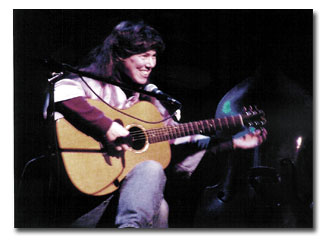
by Clarelynn Rose / Heartwood
Music
One
of the cornerstones of Zen Guitar is that, as we are unique
people, so will our experience with the guitar be unique.
Each person discovers his or her own way. In my experience,
the practice of Zen guitar means many things.
Technique and Composition
Learning new technique arises out of need and direct experience.
When you have a musical idea that cannot be adequately expressed
through techniques or tunings you already know, that is the
time to experiment with new techniques or new tunings. These
may be techniques or tunings you discover for yourself. Or
perhaps you have heard someone else do something that deeply
resonates with you musically. Often these ideas or tunings
will come to mind when you are pushing your usual boundaries.
Or they may resonate so strongly with you that they themselves
inspire you.
In my own experience, I learned simply by playing what sounded
good to my ear, using technique that feels very natural and
comfortable to my own fingers. As I have needed to express
more complex musical ideas, the technique has come very organically
through practicing licks or techniques that were slightly
beyond my grasp. If something doesn't come naturally, I figure
it will always sound a little stilted and so look for another
way to play it. Of course, sometimes someone will demonstrate
a cool technique or tuning that completely captures my imagination,
so even if it doesn't feel completely natural, I'll work at
it to see if after a lot of practice it starts to feel right.
But if it still feels awkward, the decision is always to drop
it. Zen guitar is about finding a true, very natural voice,
not about making every voice sound natural and true to a single
individual!
The Breath
Before you start to play, take a breath. Just as in meditation,
it helps you (and other listening to you) focus on the present
moment and the music being played.
Mindfulness
Mindfulness has many aspects, extending to composing, practicing,
and performing. In composing, it might mean being aware of
the value of and using emptiness and space. It also means
recognizing and valuing the peaceful, centered feeling that
Zen guitar music can generate, whether the music is mellow
or joyous. Another example is that mindfulness can foster
a feeling of completeness with only one instrument. There
is no need to fill up the spaces in the music and our minds
with a lot of instruments or a driving drumbeat.In practicing
guitar, another manifestation of mindfulness is to expect
and even welcome mistakes. They contain wonderful ideas. And
in performing, mindfulness can mean things like remembering
to connect with the audience and to remain humble, recognizing
ourselves simply as a conduit of music.
Personally, I use space in several ways. Most obvious is the
use long pauses and sustained notes in many of my pieces.
A different kind of space is letting compositions "breathe",
taking as much time as they need to develop. Nothing is rushed,
because if a composition is forced, it will sound forced.
When practicing, I listen to mistakes and then decide whether
or not to discard them. And in performing, I constantly remind
myself that the true purpose of performing is for the benefit
of others, connecting with people through a shared musical
experience.
Humility
Playing Zen guitar is about exploring a way to communicate
with others. Those of us exploring Zen guitar are blessed
with an inclination towards music, a desire to play, and some
level of natural talent. These are gifts to be shared with
others. A second aspect of humility is to recognize that all
things are our teacher, and that techings that will allow
us to advance in our study of guitar are all around us all
the time.
An important lesson came from my Tai Chi teacher in China
years ago. It is an old Chinese saying: "The ten thousand
things (all things) become my teacher." That is, you
have something to learn from every person and every thing.
That includes beginning guitarists and even people who don't
play guitar. One of my important lessons in playing guitar
came from an autistic child who could hardly utter a word.
The Zen guitarist tries to remain open to all teachers.
Clarelynn
Rose/Biography
Primarily exposed to classical music as a youngster near
Chicago, Clarelynn played in various quartets and orchestras,
including the Chicago Youth Symphony. She received various
honors as a violist, including selection as first chair violist
in the Illinois All-State Orchestra at age 15. She also learned
the harp.
When
her viola and harp were burned, she picked up the guitar
at age 17. Immediately she began writing her own music, which
she found was the quickest way to make music with her new
instrument. She has remained a largely self-taught player
who relies on intuition when composing. "I try different
harmonies and rhythms. My heart and my ear know when it's
right. It's rare that I write things down, as it's easier
to remember the shapes and phrases."
In 1999, Clarelynn had the good fortune to attend a one-week
seminar with guitarists Alex de Grassi and John Renbourn.
Since then, de Grassi has been a mentor providing feedback
on her compositions, which has improved the orchestration,
color and texture of her pieces immeasurably. Renbourn has
remained an important mentor as well, with his influence
introducing a lively Celtic sound into her music.
After
establishing her independent label, Heartwood Music, in
2000 Clarelynn produced her debut CD, The Redwood Sidthe.
This album as well as her second, Elegant Tern, contain a
mix of new pieces and old compositions that date back to
the mid-1980s. In 2004, after hearing recordings of Robert
Barto performing the works of Weiss on the lute, she took
up the 13-course baroque lute. After studying briefly with
Barto at the Lute Society of American seminar in 2004, she
recorded her first baroque lute composition for the third
album, Meadow Run. In the words of one reviewer, this most
recent CD has established her as "clearly one of the
premier steel string acoustic guitar soloists/composers playing
and recording today."
She has performed extensively throughout Northern California,
having shared a stage with Alex de Grassi, Steve Baughman,
Dorian Michael, and Teja Gerken. She has performed in China,
near Chongqing (Sichuan) and Linan (Zhejiang). Other performances
have taken her to Illinois, Oregon, Nevada, and Utah. Her
CDs are available at selected bookstores and on the internet.
The unique style of acoustic fingerstyle player Clarelynn
Rose reflects her unique life experiences in the woods,
in China, and as a Buddhist. A resident of California since
college days, Rose has developed an elegant and enchanting
blend of Celtic and New Age.
As a
forester, she has spent a lot of time outdoors. "My
music is a kind of natural resources interpretation. When
writing a piece, I get a feeling about it and match that
to a feeling I've had elsewhere. Often that an experience
in the woods."
While studying in Santa Cruz, a friend who thought Clarelynn's
compositions were reminiscent of Alex de Grassi's introduced
her to the Windham Hill recordings, which were a tremendous
influence and inspiration. Shortly afterwards, she had
an opportunity to study briefly with Windham Hill guitarist
Daniel Hecht.
Spending
two years living in China as a university student, Clarelynn
learned to speak Chinese and wrote songs in Mandarin.
She also studied Qigong, TaiChi, and Daoist and Buddhist
teachings. After returning to California, she continued her
Buddhist studies and now attends sessions at the local monastery.
Her compositions Amitabha Buddha and Song of Putuo Mountain
are based on traditional Buddhist chants.
Clarelynn
has explored the concept of Zen guitar, finding that many
of the principles of her Buddhist practice can
be directly applied to practice, performance, and composition. "Playing
guitar, for example, often gives me the same centered, grounded
feeling as meditation," she comments.
A Registered Professional Forester with masters degrees
in both Forestry and Environmental Engineering, Clarelynn
donates a portion of CD sales to environmental education.
To date, donations have topped $1,000. She has been active
in community forestry and education for wildland fire protection.
In addition to serving on the boards of the Mendocino County
Fire Safe Council and a local outdoor education project,
she was elected chair of the Northern California Society
of American Foresters. Formerly a SmartWood-certified Resource
Manager, she has consulted with SmartWood, assessing the
sustainability of forestry operations in various locations
in China and the US.
Music
Downloads from Clarelynn Rose
Guitar
Zen - Rev. Heng Sure Ph.D.
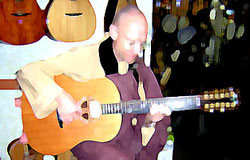
Rev.
Heng Sure, Ph.D. is the Director of the Berkeley Buddhist
Monastery and teaches the Buddha Dharma in traditional
and
nontraditional ways. Guitar Zen is skillful means, and a
way to help Western students of Buddhism relate to the
Dharma
in a fun and useful way. Find below, a few examples of Guitar
Zen for free download. -- http://paramita.typepad.com
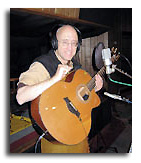
My
Interview with Rev. Heng Sure, Ph.D. on Monks in the
West II a monastic gathering and recording his first CD
of original
Buddhist folk Music. - An Urban Dharma Podcast:
Posted - 11/2006 - 1
hr 3 min
- MP3 - 14.5 MB --> Free
Download
***
Samadhi
Shoes / MP3.mpg - 2 MB
Ballad of Super Strong
/ MP3.mpg - 1.8 MB
©2004,2005,2006/Heng Sure
***
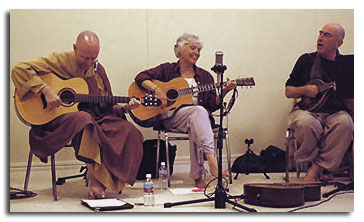
Music in the Dharma, Dharma in the Music
with Rev. Heng Sure, Betsy Rose & Alan Senauke
Recorded Live, Friday, June 10, 2005
Music
in the Dharma - Recorded Live at IMC
The
joys and teachings of dharma flow through every human activity.
The creation of sound and rhythm in the midst of space
and silence has always helped people wake up to life. Music
flourished in specific ways in every culture around the
world, and it has the ability to cut through our perceived
differences. This evening at IMC brings together three
Western practitioners of Buddhism and of music. Their folk-rooted
acoustic music combines tradition and innovation much as
our practice here in California does the same. But the
bottom line is that we can share and enjoy this music together.
___ ___ ___
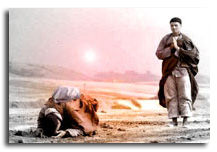
American
Pilgrimage - Three Steps, One Bow for Peace
eBook - 352 Pages - Text and Photos - (1.6 MB) -
eBook Free Download
News
From True Cultivators — Heng Sure & Heng
Ch'au.
The
letters of Heng Sure and Heng Ch'au...
Three steps and a bow. That's how they walked it. Two monks
on a pilgrimage of peace that took them through a series
of wide-ranging encounters and extraordinary experiences
-- within and without. These letters and photos are a record
of their amazing journey.
Two American
Buddhist monks on a journey of a lifetime, from downtown
Los Angeles to the City of Ten Thousand Buddhas in Talamage,
California. A
journey of more than 800 miles that took two years and
nine months to complete. They bowed in peace, and for
peace...
Dedication of Merit
May every living being,
Our minds as one and radiant with light,
Share the fruits of peace,
With hearts of goodness, luminous and bright.
If people hear and see,
How hands and hearts can find in giving unity,
May their minds awake,
To Great Compassion, wisdom and to joy.
May kindness find reward,
May all who sorrow leave their grief and pain;
May this boundless light,
Break the darkness of their endless night.
Because our hearts are one,
This world of pain turns into Paradise,
May all become compassionate and wise
May all become compassionate and wise
"Heng
Sure tells us it is a gesture of grace, where you share
the blessings all the goodness the merit
you have within. You send it out to the world with a wish
for wherever you see need for wholesome change -- specific,
general, personal or universal. "The spirit of giving
sends the gift, the prayer for well-being, throughout the
world, to all creatures as far as our minds extend."
On
his guitar Heng Sure plays the tune to which the Dedication
has been set. I am not sure what I am feeling, but it’s
overwhelming. This is what they did; at the end of every
day, these two, having walked long hours in their microworlds,
they'd turn it back, dedicate it outwards, give it to the
greater world.
We, who
were not part of that journey, listened to them; and listening,
it became impossible to remain untouched,
unmoved – not implicated.
You
realize that they walked for the people you meet on the
streets, and the one's you've never seen and never will,
they walked for people they knew and the one's they didn't.
They walked for me -- and for you. And in that sense all
of us were a part of their journey." - from An
Evening with Heng Sure and Heng Ch'au by Pavithra Krishnan
***
Dedication
of Merit/Compassionate and Wise
by Rev. Heng Sure
We
are two monastic communities, Mahayana Buddhist and Benedictine
Catholic, who have used a piece of Loreena McKennitt's
music for our worship. We have recorded a song called (alternately) "Dedication
of Merit," and "Compassionate and Wise." The
song "Dedication of Merit" was born as an antidote
to the grief and helplessness following 9/11 and the fall
of the two towers. - Dedication
of Merit/Rev. Heng Sure - Free
Download - MP3(3MB)
Fr.
Cyprian Consiglio a Christian monk, and his collaborator
John Pennington adapted it a bit from my version, adding
percussion, and a Sanskrit chant, the metta bhavana mantra.
Since that day, Cyprian has performed the song to conclude
liturgies and concerts around the globe, from India to
Italy, from New Jersey to New Mexico. He calls it "Compassionate
and Wise" and he reports the same response: people
feel healed by the tune. - Compassionate and
Wise/Fr. Cyprian Consiglio - Free
Download - MP3(5.3MB)
Electric
Sky / An Interview with Tobias Hurwitz and
his part in Zen Guitar
Podcst Interview (MP3) Tobias Hurwitz
The
story of Philip Toshio Sudo is an interesting and inspirational
one. He introduced the music world to Zen in his book Zen
Guitar, a CD by the same name, and three other Zen books.
Phil passed away at the very young age of 42, leaving behind
a wife, children, and unfinished work. Phil’s wife,
Tracy, put me in touch with a friend and collaborator who
has completed Phil’s vision of a follow-up to Zen
Guitar. In this show, I have the pleasure of sharing a
conversation
I had with Tobias Hurwitz.
* Dream power-trio tour: Cream, The Police and ZZ Top?
* Figuring out Podcasting technology
* Song: Zen Guitar by Tobias Hurwitz
* Conversation with Tobias Hurwitz
* Background music: Rock Garden Rain by Philip Toshio Sudo
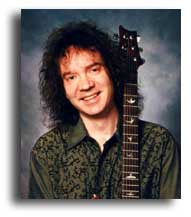
Tobias Hurwitz
GIT graduate Tobias Hurwitz resides in Baltimore,
Maryland where he has been avidly playing rock guitar since
1977. During the summers he works for The National Guitar
Workshop, teaching their Guitar Gods Of The Seventies seminar
in Connecticut and directing their DayJams rock music camp
in Baltimore. He has also designed the rock curriculum for
the NGW and for DayJams. You can hear Tobias play his heart
out on his two solo releases, The
Way Of Zen Guitar, and
Painted
Sky, which features P-Funk alumnus, Dennis Chambers
on drums.
Tobias
has been widely published by magazines like Guitar Player,
Guitar one, and Guitar, and has authored many books
for The National Guitar Workshop and Alfred Publications.
Tobias has jammed or recorded with many musical giants including
Michael Angel Batio, Stanley Clarke. J. Geils, The Coasters,
Joe Pass, and Dennis Chambers. Tobias is deeply involved
in the Zen Guitar movement sparked by the book “Zen
Guitar”, by Philip Toshio Sudo. Hurwitz and Sudo were
working together on the sequel to “Zen Guitar” when
Sudo tragically passed away from cancer in June of 2002.
Tobias is now finishing the book in the spirit of Sudo’s
vision.
New projects
include www.shredplanet.com,
a super-cool web-zine dedicated to playing and learning
intricate guitar, and video
lessons on www.workshoplive.com, the NGW’s flagship
offering. He is an endorsee for PRS Guitars, Ernie Ball Strings,
and Budda Amplification.
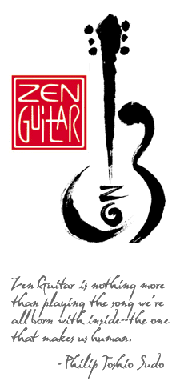
The Zen Guitar Dojo is a Place to Be
Based on the spirit and principles of the Japanese dojo,
it is a participatory community that seeks to elevate the
human spirit through music. Part artist's collective, part
magazine, part radio station, part TV network, part record
label, part rehearsal studio, the Zen Guitar Dojo is a gathering
place for artists who want to explore the possibilities
of cyberspace under the umbrella of the Zen Guitar philosophy.
Whether you bookmark this site and find it worth returning
to again andagain depends in large part on how interesting
a place you, and we collectively, decide to make it.
Dojo (calligraphy above) is a Japanese word usually translated
as "school" or "training hall," but
literally means "Place of the Way"--the great
Way of life that governs the universe. As such, the term
has a spiritual connotation. It is through participation
in the dojo that one follows the Way.
What makes a dojo special is not its location or physical
characteristics, but one's behavior in it. A dojo can be
anywhere, even cyberspace. What's essential is a group of
participants willing to work in the spirit of self- and
mutual respect.
Here we seek to establish a dojo on the Internet. With your
participation, we can create a place of vibrant content,
where your work can get noticed and we can learn from each
other. Membership in the dojo is free. All you need do is
make the site work for you. Sound good?
As Duke Ellington used to say, "If it sounds good,
it is good."
-
Excerpted from the introduction to Zen Guitar, a book published
by Philip Toshio Sudo. -
Welcome
to the Zen Guitar Dojo. Please leave the door open.My name
is Philip Toshio Sudo, and I have established this dojo
for anyone who wants to make music. It makes no difference
to me whether you're a musician or not. You're welcome here
if you're of the spirit to make a sound.
I began playing the guitar as a child in Japan, the land
of my ancestors, and have continued playing in the United
States, my homeland. Over the years I've learned from many
different teachers, both Japanese and American. As the product
of these two cultures, I've sought a way to blend the wisdom
of East and West into a universal philosophy of life.
The
way I've found is Zen Guitar.
Zen
Guitar is nothing more than playing the song we're all born
with inside--the one that makes us human. Any one of us can
do it. The music is waiting there to be unlocked.
This
dojo will give you the key.
My
intention here is to share what I've learned in the hope it
might encourage you to strum a new song in the world. As the
name implies, Zen Guitar is based largely on the principles
of zen philosophy. Zen is most easily understood as a common-sense
approach to all things. Some people come to know zen through
meditation, others through the martial arts, or archery, or
flower arranging. All these are paths to the same wisdom.
Here
we seek to know zen through music.
What is the Zen Guitar Dojo?
I named this the Zen Guitar Dojo because it is a place of
work and contemplation. Dojo is a Japanese word meaning, literally,
"Place of the Way"--the ultimate Way of life and
death that governs nature and the universe. It is through
our endeavorsin the dojo that we discover the Way.
A good dojo is like a school, practice hall, and temple rolled
into one. The aim is to train body, mind, and spirit together,
at the same time.
You can make a dojo anywhere. Just as a believer does not
need a house of worship to pray, a student of music needs
no special place to play Zen Guitar. A bedroom, basement,
garage, porch, or street corner will serve just fine. All
that's required to make a dojo is the proper frame of mind.
What will I learn?
My approach to the guitar brings in various teachings from
the zen arts of Asia: martial arts such as karate and aikido,
brush-style calligraphy, samurai swordsmanship, and the Japanese
tea ceremony. As in the tradition of these great arts, I believe
that learning to play the guitar is inseparable from learning
to harmonize body, mind, and spirit. To truly play from your
soul, you must have all aspects of yourself working together
as one. As you develop this harmony, it will carry through
to everything you do. In other words, what you learn in this
dojo will apply to your work, school, athletics, relationships,
home life--how you think, see, feel, and hear all day long.
Because ultimately, the path of Zen Guitar is the path of
life itself.
How much musical experience do I need?
This dojo is for beginners and advanced students alike. I
make no distinction between age or past experience. Anyone
who wants to train here, regardless of ability, starts at
the same point: wearing the white belt, just as one would
in studying a martial art. Even a black belt in karate, for
example, must put on a white belt when beginning the study
of another martial art like judo. It is no different here,
no matter how long you've been playing or who your other teachers
have been.
Donning the white belt does not mean you are a novice, though
there is no shame in being one. In fact, in many ways, novices
have an advantage over those who come from other schools and
may have to unlearn certain ways of thinking. Wearing the
white belt merely signifies that you are willing to learn
the Way of Zen Guitar.
What kind of instruction is it?
You should know from the beginning that Zen Guitar is not
a conventional "how-to" program of instruction.
It is "alternative," meaning it requires a do-it-yourself
spirit. There are no chords or tunings or music theory in
this dojo; you won't find lessons on how to read music, play
the blues, fingerpick, or copy "Stairway to Heaven."
All of that is information. Information is something you can
get from a gamut of sources--magazines, books, classes, friends,
videos, computer networks. The world is swimming in information.
Any student with enough dedication knows how to acquire information.
But information alone cannot teach you what you need to know
to play your song. At the Zen Guitar Dojo, our aim is not
to acquire information, but wisdom. The idea here is to train
and to experience; it is only through the experience of oursenses
that we truly gain wisdom. One cannot learn Zen Guitar simply
by reading. Just as no words can teach us how to ride a bicycle,
the only way we learn to play our song is through the direct
experience of our bodies. To learn through experience--that
is the path of Zen Guitar. There is a zen saying, "Paths
cannot be taught, they can only be taken." So it is with
Zen Guitar.
How will I learn?
My function here will be to act as your guide. I do so in
the spirit of the Japanese sensei--not "teacher,"
as the word is commonly translated, but literally, "one
who has gone before." I do not claim to know all the
answers. But what I have learned, I'll gladly share with those
who wish to make a similar journey. If I can inspire you to
follow your own path, this dojo will have served its purpose.
Those who train here I regard not as students, but unsui.
In Japanese, unsui means traveling monk or truth-seeker. Literally,
it translates as "cloud and water." To be an unsui
is to embody the spirit of Zen Guitar--floating, flowing,
at once with and without form. If you learn to view yourself
in this way, your journey on the path of Zen Guitar will have
no end.
How long will it take me to learn?
Beginning students often ask, "How long will it take
me to learn the Way of Zen Guitar?" My answer is, as
long as you live--that short. Your playing may progress enough
to impress your friends in a year's time, perform onstage
in two years, or turn professional in three. But if those
are the ends you seek, your concern is not Zen Guitar. The
Way of Zen Guitar is learned day by day, minute by minute,
second by second, now, to eternity. There is no faster way.
Beginning students also commonly ask, "How long until
I get my black belt?" To them I say, you'll never earn
a black belt so long as you ask that question. To be obsessed
with the destination is to remove the focus from where you
are. The only way to progress in Zen Guitar is to put everything
into this step, right now.
How will I progress?
While it's true that in some schools a student formally graduates
from one belt level to the next, in the Zen Guitar Dojo, there
is no such graduation. Students here receive one belt and
one belt only: the white belt. Those who put in the time,
training, and effort will find their belt getting so soiled
that eventually it turns black of its own accord. Only then
will they have achieved black belt status.In Zen Guitar, the
black belt is not a goal or an end. At other schools, the
black belt may signify ultimate achievement, but in Zen Guitar,
it is only a point along the path. I have great respect for
those who reach the black belt level; it takes sincere commitment.
But the true Way of Zen Guitar asks black belt players to
redouble their training until their belt becomes so worn and
frayed it begins to lose color and returns to white. Only
through completion of that circle--white to black, black to
white--can one know the depth of the Way.
The Path of Zen Guitar
I have divided the teaching into five stages, each signifying
progression along the path of Zen Guitar.
1. White Belt: Beginner's Mind
The first stage, White Belt, establishes the proper mindset
for starting out on the path--a mindset the student must maintain
every step thereafter. This is what's called the "beginner's
mind."
2. White Belt to Black Belt: Practice
The second stage, White Belt to Black Belt, describes the
kind of training and discipline needed to progress along the
path. This is the work ethic one must maintain through all
stages of growth. In this section I also warn of some common
missteps that can lead one astray no matter how hard the training.
3. Black Belt: Responsibility
The third stage, Black Belt, explains the standard required
for excellence, as well as the responsibilities. It describes
the kind of thinking, feeling, and attitude required of a
black belt. This is the level where body, mind, and spirit
begin to fuse together.
4. Black Belt to White Belt: Barrier
The fourth stage, Black Belt to White Belt, explores the barrier
that lies beyond technical excellence and leads to a deeper
understanding of the Way.
5. White Belt: The Way of Zen Guitar
The last stage, White Belt, reveals the true Way of Zen Guitar.
I encourage students to think of these stages as broadly as
possible. You may be a novice in the world of sound, but you're
not a novice in life. Most likely, you're a black belt in
some other area--carpentry, law, cooking, computer programming,
skiing, whatever. Use that knowledge to understand the Way
of Zen Guitar, and your training in Zen Guitar will take your
existing skills to an even higher level.
Those of you already skilled in music can benefit from training
here as well. I hear many guitarists with talent who seem
to lack direction, who can't articulate a reason for doing
what they do. The Way of Zen Guitar gives those players a
sense of purpose. Not only that, it provides a framework from
which to tackle any new task. Once you learn the principles
of Zen Guitar, you can apply them to any endeavor outside
of music. Follow the samurai maxim that says, "From one
thing, know ten thousand things." Music can teach you
everything you need to know.
If you're wondering when the discussion will turn to zen philosophy,
don't concern yourself. Put your entire focus into playing
the guitar. If you do that, in time, your questions will answer
themselves.
For anyone who now wants to leave, thank you for your interest.
You are always welcome to return--there is never a time when
you cannot begin. The door to this dojo is always open. For
those of you who choose to stay, please put on the white belt.
You have taken the first step on the path.
To the --> Zen
Guitar Dojo